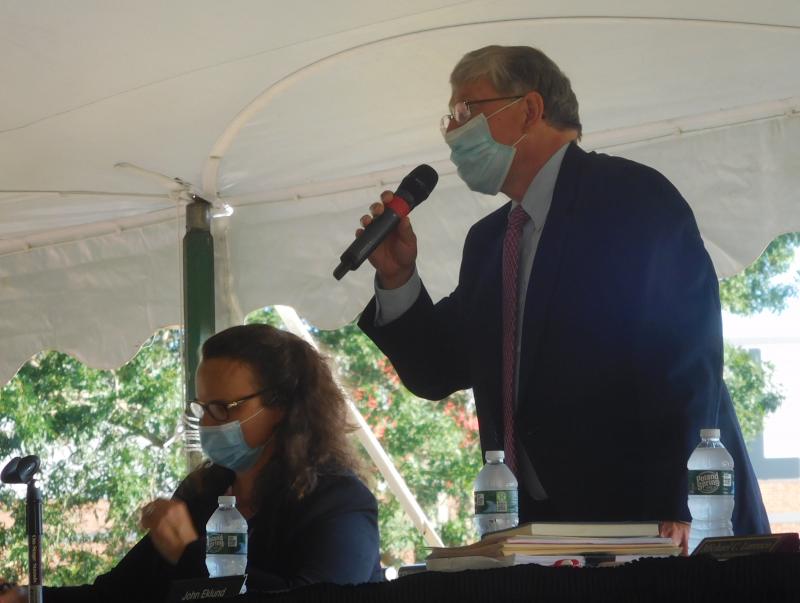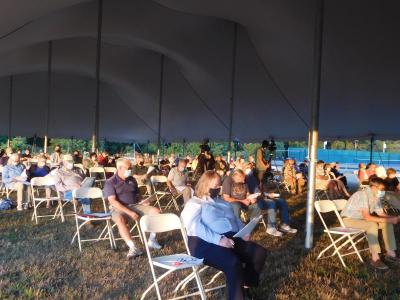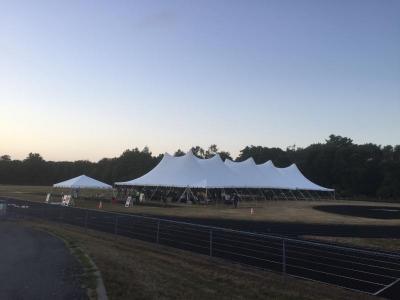After budget questions, unanimous approvals at Mattapoisett Town Meeting
MATTAPOISETT — A twice-delayed Town Meeting held “under the big top in the time of covid,” as Moderator Jack Eklund put it, unanimously passed all eleven of its financial articles.
Most comments and questions at the meeting revolved around cutting costs amid significant revenue uncertainty for next year.
Jodi Bauer noted the assessors had a substantial increase for a staff of three and asked if there had been a new hire in the department.
Town Administrator Michael Lorenco said that there had not been, but there was one employee who worked for the assessors and was also a call firefighter. He had previously been paid across multiple categories, and would now be paid just in Assessors, which accounted for the increase.
Penny Carlstrom was concerned about what she saw as a 9.8% increase in salary areas for several departments, including the Police, Fire Department and Council on Aging.
She thought this was a “concern with the times we are going through and what we may get [in aid] from the state.”
Town Administrator Michael Lorenco said most salaried employees had a 2% increase for cost of living, but not much more. (Most elected officials, with the exception of salaried elected officials are also declining a pay increase this year, Lorenco said).
“If anything, positions have been cut,” Lorenco said, adding that since he started in March the only hires have been a library director and public health nurse, positions he saw as essential.
And none of the increases were at 9.8%. That amount “in a year like this is obscene,” Lorenco said.
Bauer asked why a clerical worker in the fire department was blank, and Lorenco said that the clerk position and an administrative assistant for the Board of Health are unfilled for budget reasons.
Debbie Abelha had a problem with the fact that the school budget was not broken down like all other items by line. She felt that taxpayers have a right to know what they are paying for, and “if the two other towns agree [on the assessment first] we are forced into it.”
Lorenco said “the school has been very open with us” and that by state law the town is only allowed to post the total assessment as part of the budget. He said that for next year he will look into linking out to the more comprehensive budget in another sheet.
Selectman Paul Silva pointed out that Abelha and anyone else who is interested in the school budget could also go to school committee meetings starting in February, since the numbers are openly discussed there.
Don Carlstrom wanted to speak about the town’s $29,160,362 budget overall, rather than asking about a part of it.
He requested some of the context for a $1.1 million budget increase since 2019, and urged officials to “think about affordability for people who are currently unemployed. It will become unaffordable and they will have to give up their home.”
Selectman Jordan Collyer explained that about $400,000 is principal or interest on debt, about $400,000 pays the schools, (with about $200,000 for the local school and an equal amount for the regional school), and about $200 to 250,000 was for general government expenses.
Lorenco added that he “will look at other avenues and revenue, but can’t do [so] at this meeting. “That stuff takes time,” he explained, earning applause from the audience.
Bauer also remarked positively on a $35,000 electricity fee decrease from changing the town’s street lamps to LED lights. Lorenco responded that those savings will continue, as he plans to have the lights installed in its buildings this year.
Despite the comments and clarifications, the budget passed unanimously.
Other articles from the warrant funded $150,000 in fire station debt from the debt stabilization fund.
Silva said the town will use this funding source “until school debt falls off,” in about four years, at which point it will be able to use other sources. The town also passed easements on an Industrial Drive construction project and an Acushnet Road bridge project.















